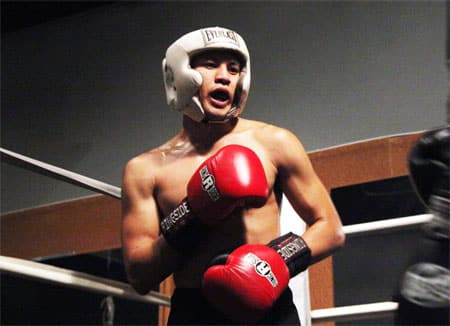
Are you getting tired for no reason? Are you running out of air during fights? Or do you just stress out behind your guard and get beat up until the bell rings?
Breathing is an essential function of life. It comes before strategy, before technique, before ANY complicated fighting movements. It’s easy to forget how to breathe because you never learned it in the first place. Breathing was always natural until you got in the ring and got distracted by all the fighting.
…but how do you expect to fight when you can’t even breathe?
Learning how to breathe allows you to rest, think, and attack powerfully!
Fighter’s Breathing Technique
Watch my video to see how I breathe.
Different breathing for different movements
Breathing gives energy to all movements. Slow and deep movements will need slow and deep breaths. Fast and bursting type movements will need fast burst breaths. Just as the character of your movements change, the character of your breath must change with it. Learning how to breathe during a fight requires learning how to breathe in different ways, not just one way.
It’s awkward to breathe slow while moving quickly and as well as breathing fast while moving slowly. Try throwing punches as you exhale a deep breath slowly…notice how your punches seem to force the air out of you? That’s because your muscle contractions and your breathing rate naturally works together.
Breathe differently for different movements.
Slow Breathing Technique for Slow Movements
Slow breathing is great for revitalizing you. It calms the mind, allowing you to rest, to strategize, and to save up more energy. You should breathe slow anytime you’re moving around the ring, in between rounds, or out of your opponent’s range. (Pretty much any time that you’re not throwing punches or slipping quickly.)
How to breathe slow
- Inhale slowly through the nose
- Exhale slowly through the nose
Breathing through the nose is the deepest and most effective way to breathe. It pulls the air deep into the stomach and gives the body more oxygen than shallow mouth breathing which often only goes to your chest.
Breathe slow to relax
Slow breathing is not supposed to be a game of holding your breath or taking forever to inhale/exhale. Breathe as slow as you need to be more relaxed; nothing more. The best (and most relaxed) fighters have incredibly calm breathing. They’re able to breathe slow even while dancing around the ring, even while blocking and slipping punches. That allows them to save their air for those sudden bursts of energy when they throw punches. If you’re a beginner: you probably won’t be able to breathe slow while on defense, at least not for a while.
The most relaxed fighters
have the most relaxed breathing,
even during intense fighting.
Fast Breathing Technique for Fast Movements
Fast breathing is perfect for fast explosive movements like punching, defending, slipping, fast footwork. Fast breathing gives your body that fast jolt of energy needed to send out sudden bursts of energy. When done excessively or incorrectly (VERY COMMON), fast breathing leaves you tired and out of breath.
How to breathe fast
- Inhale slowly through the nose (MOST PREFERABLE), or quickly through the nose (OK), or through the mouth (LEAST PREFERABLE)
- Exhale quickly through the mouth in short bursts (one burst for every fast movement—punch, slip, dash, etc)
Inhaling slowly is best for gathering more air and staying relaxed but there will always be times when you need to inhale through the mouth for quick air (such as during exchanges). Try to inhale without opening your mouth (risk of broken jaw if punched) and try to inhale deeper into your stomach instead of into your chest (too shallow and not much oxygen absorption). Air exhaled from the stomach will give you more power than air exhaled from the chest.
The difference between fast breathing and slow breathing
The biggest breathing tip is to understand that fast breathing only means faster exhale. Fast breathing DOES NOT MEAN faster air cycle. So many beginners get tired quickly when they move fast because they’re still using slow breathing technique except only doing it faster. Breathing faster (fast inhale, faster exhale) will only make you out of breath, hyperventilate, and tire easily.
The goal of fast breathing is still to breathe SLOWER by inhaling SLOWLY and exhaling QUICKLY. I probably confused most of you just now. *Johnny, are you crazy? How do I breathe slower while exhaling faster?!*
Here’s the trick to explosive breathing
YOU BREATHE SLOWER, while exhaling out quickly, by constantly shutting off the exhalation. You know that sound that fighters make when they throw punches? (The *psst!* sound or *psshb!* sound.) That sound is made not because they’re exhaling all their air quickly, but because they shut the air flow during their exhalation. Imagine if you were about to sneeze but covered your face as the sound was about to come out, it would be a small air explosion at your nostril/mouth.
This small explosive air exhalation allows for incredibly sharp explosive movements! The trick is not to use as much air possible but to exhale as little as possible. This is why mouth exhalations are perfect for “fast breathing” because you can keep blocking the air flow with your lips or inside of your throat so that you exhale only a little bit each time.
- So again, “fast breathing” is not: IN-OUT-IN-OUT.
- It’s more like: IN-outoutoutoutout-IN-outoutoutoutout. The “outs” are fast little exhalations.
If you’re exhaling through the nose, you’ll have to use the muscles inside your nose to stop the exhalations and even then a lot of air will still escape. Nose exhalations might only give me 10 bursts (10 explosive movements) whereas mouth exhalations can easily give me 20-30 exhalations (20-30 explosive movements) before I have to inhale again.
In case you’re wondering how to shut off air exhalations through the mouth, there are 2 options: one is by closing the lips (not as effective), the other is by closing the throat. You can find the right throat muscle by saying “AHHHHHHH” and then stopping and starting again. The muscle inside your throat that helps you start/stop that sound is the one you use to stop the exhalations. This is why you might notice some boxers go “AGHH!” or “EEESH!” when they throw punches.
The trick to fast breathing,
is to exhale as little air as possible!
How little or how much you have to exhale with each breath depends on your skill. A perfectly balanced, well-coordinated, skilled puncher can throw powerful shots with little exhalation and little energy. A beginner wild brawler will need lots of exhalation and lots of energy. Haven’t you ever noticed that the top fighters breathe sharply and move sharply? This type of quick burst breathing is what leads to snapping punches, quick defensive reflexes, and sharp footwork. I used to yell at beginners to “Breathe like a fast fighter, not like a slow weightlifter.” Being able to move faster without getting more tired all relies on breathing efficiency (via shortened exhalation) as well as movement efficiency (via skill).
Sharp explosive breathing,
for sharp explosive movements.
How to Practice Breathing
The ultimate goal of breathing practice is to relax your body and allow it to move naturally. It’s not about forcing your body to breathe slower or breathe faster; it’s about giving your body as much oxygen as it needs. You shouldn’t have to think about “the perfect breath”.
The purpose of breathing practice is to get used to fighting without letting outside influences (nervousness, opponent pressures, etc) affect your breathing. In a way, your fighting rhythm is really your breathing rhythm. If you’re fighting at your rhythm, you will feel comfortable, able to punch and defend and move whenever you want while using little energy. If you’re fighting at your opponent’s rhythm, you will feel like you’re always forced to attack or defend when you’re not ready (when you’re not able to breathe).
The fighter with control of his breathing,
gets to dictate his rhythm, his pace, and his fight!
Practicing Slow Breathing
The best way to practice slow breathing is to do fast (non-explosive) movements while slow breathing. Jumping rope is a perfect exercise. If you can get used to breathing slow on the jump rope, you will do very well in the ring. In fact, it’s part of the reason why I recommend everyone to use the jump rope. Another drill I recommend for beginners is to move around the ring while a partner throws many light tapping shots at your elbows. Beginners will quickly realize how easily they panic when they’re in with a live opponent. (This is why beginners do so well on the heavy bags but get so tired in sparring!)
Nose breathing puts that oxygen deep inside you and truly relaxes your body. Get used to slow and deep nose breathing as often as possible. Even throughout your normal day outside of boxing, nose breathe everywhere—at school, at the office, during morning runs.
Practicing Fast Breathing
Fast breathing can easily be practiced through rapid combination movements. This can be done by throwing combinations on the heavy bag or quick bursts of movement through shadowboxing. One quick breath for every single quick movement. Your goal is to get used to breathing faster by exhaling just enough air for each effective movement. It’s very easy to run out of air when you’re exhaling quickly! You know you’re doing it wrong if you keep getting tired (or maybe you have poor technique/conditioning).
The faster and more powerfully you breathe,
the easier it is to get tired!
Another great tip for practicing your breathing is to train with your mouthpiece. Many trainers tell their fighters to go running with a mouthpiece and hitting the bag with a mouthpiece so that you’re always used to breathing through the mouthpiece. At some point mouthpiece training isn’t necessarily once you know how to breathe right. After all the mouthpiece is made so that you’ll want to inhale through your nose and then exhale in sharp bursts through the mouth (and the mouthpiece is perfect for blocking exhalations).
Other articles on breathing techniques for fighters:





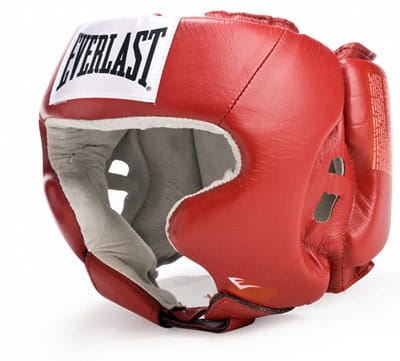

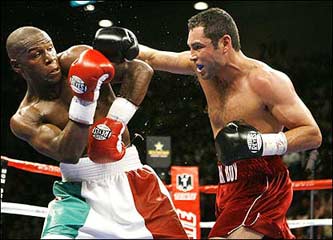
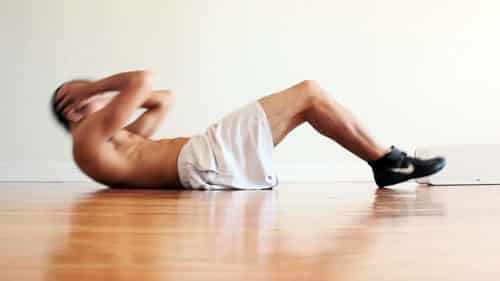
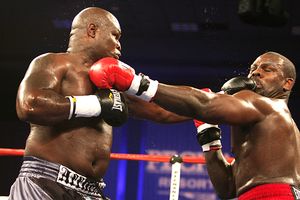
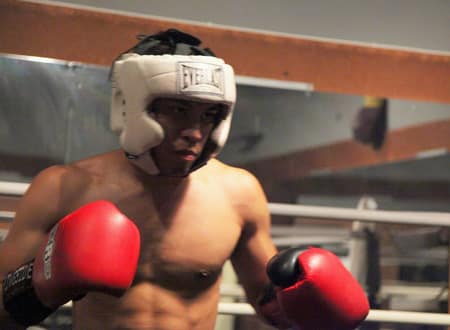
This is brilliant.
Infuckingcredible article once again johnny… so much incite and knowledge packed Into a great read…
id say the most crucial part of becoming a boxer or fighter in any combat sport is being a student of the game because it seems like when your a student of the game of watever it is you do, everything seems to take care of itself
I completely agree with this! Hope your fights are going well, Thair.
Thanks Johnny, I hope you ‘ll never stop writing these brilliant articles. 🙂
Respect again johny! Keep up the good work and thanks for sharing your knowledge!
The most concrete things about boxing. Great.
johnny what do you think about this running schedule?
Mon & Thur: long distant runs 6-10 miles
Tue & Fri: Sprints
Wed: conditioning rest, except swimming(daily, or every other day)
I think it’s fine. Nothing wrong at all. Doing less miles for the long distance days is ok, too. I would probably only run 5 miles but I’d increase the pace.
so w/ fast breathing you let a little bit of air out, does that mean that you are holding your breath until you want to do the next explosive movement?
Yes and no. It should feel natural as though you’re breathing out, except only you keep chopping the breath as you’re breathing out. So your lungs are still breathing in a flow (don’t hold with the lungs), but your mouth/throat is blocking the air flow. If there is fast movement, then I let the air exhale out naturally without any stop.
Johnny, your last paragraph answered a question I was about to ask. I’m going to start training with it my entire workout.
This is one of the best quotes ever: “Breathing was always natural until you got in the ring and got distracted by all the fighting.” so true and worded wonderfully.
your giving away all the unwritten rules of boxing..this guy is nice.. when you wat to be an expert u get down and dirty in detail..im a amateur boxer/future trainer..ive learned the sport of boxing for the past 4years just by watching alot of videos and going to the gym with the same pace and rythm as the old school pros..im a very slick counter puncher/boxer..i notice your website 2years ago and love how your seeing the same motion and rythym as me..gives me confidence that im teaching the right techniques of the true science
Thank you Maurice! Always good to see a fellow young trainer. Where did you train or learn how to box?
learned and still fight in StPaul Minnesota ..been around the state, had atleast 5 different coaches so far but with a nice family now that has some boxing history..
That’s awesome. Let me know when some of your guys win the golden gloves or other regional tournaments. I’m trying to get one to the golden gloves soon.
how do you make a that sharp snapping sound when you punch when you have a mouth guard on? It seems to make it hard for me to do that breathing sound when you have the mouth guard on.
If anything, the mouthguard can HELP you make that sound because it blocks the airflow. Imagine if you were trying to breathe through a small hole, it always sounds like a hiss because the air is being restricted. Don’t worry about the sound your mouthguard makes; just get the breathing technique right.
Another great article. Johny your articles are the most well written and informational articles on the internet, and its awesome how you actaully read and respond to the comments. Your website has helped so much in just understanding stuff and learning how to be a good boxer its kind of like a second coach.
I try my best, thank you.
hey Johnny, what is the best excercise to boost stamina, in order not to get tired in a 3 round real match.
More sparring!
Hey Johnny.
I’m suspected of having a deviated septum, since I was young i could only breath through one of my nose and after recent sparring I am not able to breath through my nose.
I have a fight coming up in February, and I have yet to see the doctor because of the holidays.
Is it wise to get a surgery to help my deviated septum before a month from fighting? do you think the surgery will permanently get rid of my problem or the fight will only bring it back?
Great articles by the way, keep it up!
I think you should speak with your doctor about this. I don’t want to substitute for a qualified medical opinion. If getting surgery can improve your performance and help you live your life better, I would do it ASAP.
is shouting necessary in boxing breathing? does it help in breathing? some boxers in our gym shouts while punching. does it add power? i also do taekwondo and we are required to shout during kicks and punches, it relaxes in my experiece; shouting releases tension and stress. but in boxing its a different thing, its pretty akward when all the boxers just do hisses and some radical boxer shouts; his gym mates might think this isnt kungfu, this is a boxing gym
It’s a matter of personal preference, habit, and mouthguard. Sometimes boxers prefer to make a certain sound because they like to exhale a certain way. Other times, it has to do with the way their mouthguard is shaped. A sharp exhale does make you more powerful.
how long should I jump rope in a day and how should I breathe while jumping ? I am a beginner .
and by the way your article was outstanding .
Breathe through the nose when you’re jumping rope.
I’m a beginner and I want to know what are all the workout I need to do.
Read my “EASY Boxing Workout”
how should we breathe with a bloody nose, running nose or a stuffed nose from allergies before competition or sparring?
You’ll have to use your mouth.
Hi Johnny,
I was looking for breathing tips during sparring and found this website. I already learned alot!
But I was wondering, I’m still a beginner and during sparring I get really anxious (holding my breath when punching or receiving a punch) and ofcourse after a minute I don’t have any oxygen/energy left. Obviously I will work on this with your above tips, but learning takes time! In the meantime do you have any tips for getting some oxygen back during a 5 min round of “anxious beginner sparring”. Most of the time the last minute of the round I can only breath in a hyperventilating manner. Even slow breathing is very difficult.
Thanks!
Read my guide on how to increase your fighting endurance. Lots of good tips there for you, Kelly!
Thanks!
Hi Johnny,
I have a question about nose breathing. Do I only want to exhale out my mouth when I’m throwing punches? Also, when I’m running out of breath, keep my mouth closed, and take deep breaths inhaling and exhaling out only through my nose?
Exactly. Mouth exhalations when throwing punches. And deep nose-breathing when trying to recover.
Thanks for this Johnny. You’re the man!
What kind of mouth guard should I use?
There are many good mouth guard brands out there. I use Brain-Pad.
Freddie ‘La Cucaracha’ Roach has nothing on you.
Thank you Teacher.
Gonzo
That is a high compliment. Thank you, Gonzo!
This is golden stuff. Very few trainers explain in such detail about breathing, and they usually only talk about exhaling.
I get how inhaling after punching would work in sparring but I don’t find that I have enough time to inhale during fast mit work combinations with the trainer. Have you trained to breathe independently of your punching rhythm or do you do say a 1-2 inhale, 1-2-3 inhale etc. I cant time the inhale fast enough when doing rapid mit work or heavy bag work and end up only exhaling until I pause but the trainer wants us to try to go for three minutes of course. Also, I am a beginner and the trainer has us do 50 rapid punches on the heavy bag for conditioning. That is also difficult to time the inhale.
By the way, deep nose breathing for recovery is also taught in Karate.
look out for brandon kubinski lol i want this to b my job so i have to get good but i wanna b a big pro and i wanna live off this but im 15 so i have some time to get ready yet but how should i breath if i wanna run for a good long time
Hey i have a question, i always breathe in and out through the nose. Only question i have is….when i throw the punch should i exhale out mouth or still out my nose?
When you throw a punch, it is advisable to exhale through your mouth, so that you can control the amount of air exhaling better.
Well researched, well written and of great help to any new and even old boxers.
Hello Johnny this is a good article it really helped me. I just started boxing and age 19 is it a proper age to start boxing?. One more things what do you think I should concentrate on doing now as a beginner?,
Any age is fine to start boxing. Check out my “Beginner Guide to Boxing”.
Great instruction. Will share it with my lacrosse team.
Jonny,
Great article, could you recommend a mouth guard?
All the best,
Andrew
I have a mouthguard review coming out but for now, my answer is BRAIN PAD!
A-ha awesome!
I used to own one, left it at the gym and never seen since.. nightmare
Cheers Johnny